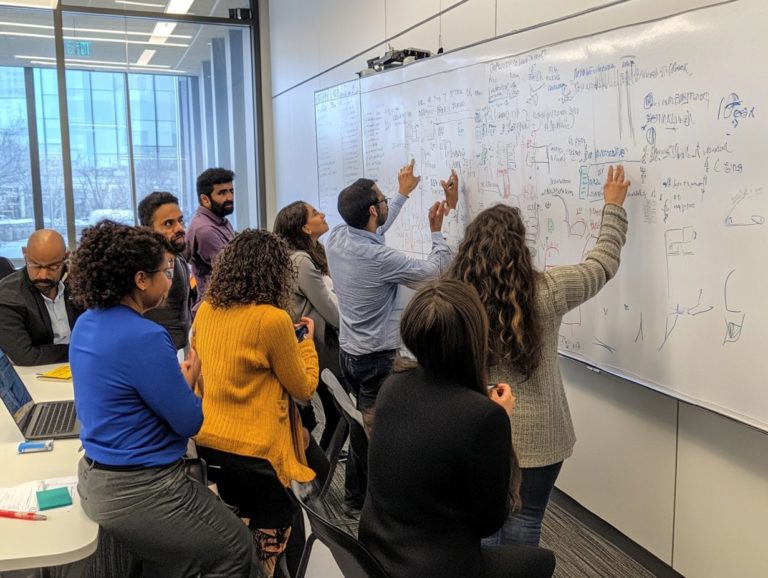7 techniques for language learning through travel
Traveling presents a remarkable opportunity for you to immerse yourself in new languages and cultures, making it one of the most effective avenues for learning.
Let s unlock the secrets to learning languages while traveling! Here are seven practical techniques to elevate your language learning journey:
- Engage with locals.
- Leverage technology.
- Keep a journal.
By engaging with locals, leveraging technology, and keeping a journal, you ll forge a deeper connection with the language while exploring new environments. You’ll also navigate common challenges and mistakes, ensuring you maximize your adventure.
Are you ready to transform your travels into a vibrant language learning adventure? Let s dive in!
Contents
- Key Takeaways:
- 1. Immerse Yourself in the Local Culture
- 2. Practice Speaking with Locals
- 3. Take Language Classes or Courses
- 4. Use Language Learning Apps
- 5. Read and Listen to the Language
- 6. Keep a Language Learning Journal
- 7. Use Language Exchange Programs
- How Can Travel Enhance Language Learning?
- What Are the Benefits of Learning a Language Through Travel?
- How Can One Overcome Language Barriers While Traveling?
- What Are Some Tips for Choosing the Right Destination for Language Learning?
- How Can One Make the Most of Their Language Learning Travel Experience?
- What Are Some Common Mistakes to Avoid While Learning a Language Through Travel?
- Frequently Asked Questions
- What are the 7 techniques for language learning through travel?
- How does immersion help in language learning through travel?
- What is conversation exchange and how does it aid in language learning through travel?
- Are language classes helpful for language learning through travel?
- How do cultural activities contribute to language learning through travel?
- Are language learning apps effective for language learning through travel?
- What is a language challenge and how can it benefit language learning through travel?
Key Takeaways:

- Immerse in local culture for language absorption.
- Practice speaking with locals to build confidence.
- Utilize classes, apps, and resources to enhance your learning.
1. Immerse Yourself in the Local Culture
Immersing yourself in the local culture improves your language skills and deepens your understanding of the community and its traditions.
Whether you wander the vibrant streets of Cusco or participate in community projects in Ghana, embracing local customs can elevate your travel experience.
Engaging in regional festivals allows you to witness authentic celebrations and connect with locals eager to share their heritage.
Sampling local cuisine ranging from tantalizing street food to traditional homemade dishes gives you not just a taste of history but a genuine connection to the people who prepare them.
Volunteering or interning abroad presents a unique chance to forge friendships and enhance your language proficiency through daily interactions.
These experiences create meaningful cultural exchanges that go beyond mere sightseeing, allowing you to cultivate a profound appreciation for diverse lifestyles and customs.
2. Practice Speaking with Locals
Practicing speaking with locals is one of the most effective strategies to elevate your language skills and foster confidence in your conversational abilities, especially while learning Spanish in vibrant places like Cusco.
Engaging in genuine conversations with native speakers polishes your pronunciation and expands your vocabulary, while enriching your understanding of the culture and the intricacies of the language.
To find language partners, frequent cozy coffee shops or community centers where locals gather. Don t hesitate to initiate a conversation or leave a friendly note on a community board expressing your interest in a language exchange.
Make speaking a daily ritual whether it s ordering your coffee en espa ol or chatting with a neighbor. This practice reinforces your learning, builds familiarity, and enables you to communicate with confidence across various contexts.
3. Take Language Classes or Courses
Enrolling in language classes or courses offers you a structured path to learning, enabling targeted improvements in vocabulary and grammar crucial components for mastering Spanish or any foreign language.
These structured programs differ significantly based on the country in which they’re offered, with many Spanish-speaking nations presenting unique hands-on experiences. You can select from traditional classroom settings to more community-oriented programs that seamlessly integrate lessons with cultural activities.
The advantages of such structured learning are amplified when paired with practical application; engaging with native speakers deepens your understanding and solidifies your language skills.
Whether you’re exploring local markets in Mexico or joining dance classes in Argentina, each interaction enriches your learning journey, making retention not just effective but enjoyable as well.
Start your journey today!
4. Use Language Learning Apps
Language learning apps present a convenient and flexible avenue for you to develop foreign language skills. They are great tools for travelers looking to enhance their communication abilities while exploring new destinations.
With a plethora of options at your fingertips, these apps cater to a variety of needs ranging from interactive lessons that include games for learning to immersive experiences that connect you with native speakers.
Popular choices like Duolingo offer bite-sized lessons, perfect for those quick daily practice sessions. Meanwhile, Babbel hones in on real-life conversational skills that can prove particularly useful in everyday situations.
To truly maximize your learning while traveling, consider these strategies:
- Set dedicated times each day for practice.
- Use the apps for vocabulary refreshers before stepping into a new place.
- Engage in local conversations using the phrases you’ve learned.
Using these apps strengthens your learning. It also makes your travels more rewarding.
5. Read and Listen to the Language

Reading and listening to the language are essential pillars of effective language learning, greatly improving your understanding and speaking while immersing you in the vibrant cultures of Spanish-speaking countries.
Engaging with authentic materials such as novels, podcasts, and local news outlets is vital if you aim to truly grasp the intricacies of the language. Imagine diving into the language through podcasts and books! You’ll discover so much more than just words.
For example, diving into the works of celebrated authors like Gabriel Garc a M rquez sharpens your language skills and offers a window into the rich cultural traditions of Latin America.
Tuning into podcasts like Radio Ambulante or exploring local Spanish-language news websites provides you with a real-time perspective on current events and everyday life, making your learning experience both engaging and relevant.
6. Keep a Language Learning Journal
Keeping a language learning journal is an incredibly effective way for you to track your progress, reflect on your skills, and reinforce daily practice. It becomes an invaluable companion as you embark on your language travel journey.
By structuring your journal into specific sections, you can cultivate a more organized approach to your studies.
- Dedicate a vocabulary section to new words and phrases you encounter each day so you can easily refer to them and practice.
- A grammar notes area will help clarify language rules and highlight common mistakes, deepening your understanding of the structure.
- Incorporate reflections on your interactions with locals to gain rich insights into the real-world applications of your skills, making the learning process both contextual and engaging.
Regular entries will document the challenges you face and the milestones you achieve. They will also serve as a wellspring of motivation and encouragement throughout this rewarding journey.
7. Use Language Exchange Programs
Language exchange programs offer you an exceptional opportunity to practice speaking with native speakers while engaging in community activities. This elevates your language skills through authentic interactions.
By immersing yourself in these enriching experiences, you can cultivate a deeper understanding of cultural nuances and enhance your conversational abilities.
Many individuals successfully find language exchange partners through online platforms or local meetups, facilitating a dynamic form of tandem learning where one person teaches their language while the other reciprocates.
These exchanges can take on various forms, from casual coffee chats to well-organized group events, often resulting in lasting friendships.
Countless success stories reveal that participants not only become proficient in a new language but also gain invaluable insights into diverse cultures. Don’t miss out on the chance to connect with locals!
Start practicing now and see how quickly you improve!
How Can Travel Enhance Language Learning?
Travel enriches your language learning journey by providing immersive experiences that allow you to engage with the language and culture in authentic settings. To enhance this experience, consider exploring 7 ways to integrate language learning into daily life, which fosters deeper connections and practical skills in your daily interactions.
This dynamic process not only expands your vocabulary but also helps you internalize challenging grammar structures through real-life application. When you manage everyday situations whether you re ordering food at a charming caf , asking for directions, or participating in local events you practice speaking in a supportive and forgiving environment.
Exposure to local customs and traditions adds context to the differences in the language, making your conversations far more meaningful. This daily practice transforms language from a theoretical exercise into a practical tool, enabling you to communicate effectively and confidently, ultimately accelerating your journey toward fluency.
What Are the Benefits of Learning a Language Through Travel?
Learning a language through travel presents you with a wealth of benefits, including enhanced communication skills and a deeper cultural awareness. To make the process even more enjoyable, consider exploring 7 ways to make language learning fun, which allow you to engage meaningfully with local communities.
By immersing yourself in new environments, you ll find it easier to connect with people every day, transforming travel from a mere hobby into a powerful avenue for personal growth.
These experiences can significantly bolster your confidence as you chat with locals, haggle in markets, or join in cultural festivals, often leading to lasting friendships. Engaging with diverse communities enriches your understanding of various traditions and lifestyles, cultivating empathy and adaptability.
For instance, taking a cooking class abroad not only bridges cultural gaps but also creates memorable connections while sharpening your language skills through practical, hands-on experience.
How Can One Overcome Language Barriers While Traveling?

Overcoming language barriers while traveling is essential for effective communication. You can achieve this through strategies like learning key phrases, utilizing language apps, and engaging with local speakers. For more insights, consider these 7 tips for effective language learning in groups.
To elevate your travel experience, it’s beneficial to prepare in advance by researching cultural differences and practicing pronunciation beforehand. Real-time strategies, such as carrying a small phrasebook or using translation apps, can facilitate smoother interactions, especially when unexpected situations arise.
Engaging in community events or volunteering helps you connect with locals and offers invaluable opportunities to practice the language in a supportive environment. Engaging in these activities boosts your language skills and your confidence, making your journey a rich tapestry of cultural exchange and personal growth.
What Are Some Tips for Choosing the Right Destination for Language Learning?
Choosing the right destination for your language learning journey is crucial for developing your skills. Consider factors like the availability of language classes, opportunities for cultural immersion, and the willingness of the local community to engage with learners.
Evaluating these aspects can significantly enhance your overall experience. For instance, vibrant cities like Cusco, nestled in the heart of Peru, offer a rich cultural heritage, historical significance, and a plethora of language schools catering to all levels.
Similarly, places like Medell n in Colombia or Barcelona in Spain not only provide excellent educational opportunities but also an inviting atmosphere. The locals are typically friendly and eager to share their language and culture with you.
Ultimately, your choice of destination should align with your desire for cultural engagement and a supportive community, creating the perfect environment to foster your learning journey. Don t miss out on the chance to experience local culture; dive in with both feet!
How Can One Make the Most of Their Language Learning Travel Experience?
Making the most of your language learning travel experience means diving headfirst into cultural activities, actively seeking daily practice opportunities, and engaging with local communities to cultivate authentic language skills.
To truly immerse yourself, consider joining local clubs where you can connect with residents and share common interests. Participating in workshops sharpens your language skills and provides invaluable insights into local culture.
Attending community events, such as festivals or markets, lets you practice the language in real-life situations. This makes learning fun and relevant!
Don t underestimate the impact of consistency. By weaving in small, daily practices like striking up conversations with shopkeepers or joining a local book club you can steadily build your confidence and fluency.
Ultimately, embracing these opportunities will transform your travels into a richer, more unforgettable journey.
What Are Some Common Mistakes to Avoid While Learning a Language Through Travel?
Learning a language through travel can be an incredibly rewarding experience, especially when you explore 7 ways to engage with local culture for language learning, but there are common pitfalls that could impede your progress.
For instance, failing to practice regularly or not engaging enough with local speakers can hold you back. Another frequent misstep is setting overly ambitious goals, which often leads to frustration and discouragement.
Instead, it’s essential to establish realistic, achievable objectives that promote gradual improvement. Embracing moments of cultural exchange significantly enhances your language skills.
Actively seek opportunities to participate in local events or join community groups. Engaging in conversations, asking questions, and actively listening not only bolster your linguistic abilities but also deepen your cultural understanding.
By focusing on building relationships and fully immersing yourself in your surroundings, you can greatly enrich your language-learning journey.
Frequently Asked Questions
What are the 7 techniques for language learning through travel?

The 7 techniques include immersion, conversation exchange, language classes, cultural activities, language apps, language challenges, and self-study.
How does immersion help in language learning through travel?
Immersing yourself in a country where the language is spoken allows you to hear it constantly and practice speaking with native speakers, improving your listening and speaking skills.
What is conversation exchange and how does it aid in language learning through travel?
Conversation exchange involves finding a language partner in the country you are visiting, where both of you can practice speaking each other’s native language. This helps improve your conversational skills and cultural understanding.
Are language classes helpful for language learning through travel?
Yes, taking language classes in the country you are visiting provides a structured and guided approach to learning the language, along with access to a teacher for any questions or clarifications.
How do cultural activities contribute to language learning through travel?
Participating in cultural activities, such as festivals or cooking classes, allows you to learn about a country’s customs and traditions while practicing your language skills in a natural setting.
Are language learning apps effective for language learning through travel?
Language apps are handy tools that help you learn phrases quickly, but they should not be relied upon as the sole method of language learning. It’s important to also practice speaking and listening with native speakers.
What is a language challenge and how can it benefit language learning through travel?
A language challenge involves setting a goal for yourself, such as ordering food in the local language every day, and actively using that language in your daily interactions. This helps improve your confidence and fluency.





